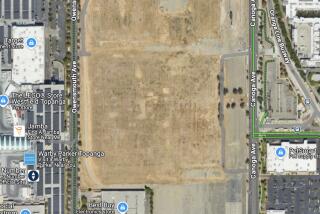Chemical Company Lawyers Say Lockheed Withheld Safety Rules
- Share via
Lawyers for chemical companies, in closing statements Tuesday in a long-running toxic exposure trial, argued that their products had not harmed Lockheed workers, blaming the giant aerospace firm for unsafe conditions at its Burbank complex in the 1970s and 1980s.
Conditions at Lockheed were “outside of our control,” Laurence F. Janssen, lawyer for Exxon, Arco Chemical Co., and several other defendants, told a Los Angeles Superior Court jury as the 6-month-old trial moved toward a close.
Chemical suppliers provided adequate warnings on the risks of their products, but “we don’t know if Lockheed is enforcing the safety rules,” Janssen said.
He cited testimony by former Lockheed workers that the company was lax on safety until the U.S. Occupational Safety and Health Administration staged a massive inspection in 1988.
Workers testified “there was no safety training,” Janssen reminded jurors. “By and large, they didn’t use respirators . . . Gloves often weren’t available, they didn’t see training films.”
Nor, said Janssen, were workers shown the safety memos--known as material safety data sheets--in which chemical firms advise customers on the risks of their products.
Janssen--the first of four defense attorneys to complete summations Tuesday--also disputed the health problems attributed to the workers, citing what he said was conflicting testimony by their own medical experts.
The trial, which began in August, pits 15 Lockheed workers against some two dozen chemical firms that supplied solvents, resins and epoxies used by Lockheed to make Stealth fighters and other military aircraft.
The plaintiffs are seeking millions of dollars in damages collectively, ranging from $50,000 for a former worker described as suffering minor problems from chemical exposure, $1 million to $2 million for others who said they have more serious problems and $10 million for the widow of a man who died of cancer in his 40s.
The outcome of the trial is expected to guide settlements or trials of pending claims by more than 600 other Lockheed workers.
The workers contend they suffered health problems ranging from impaired breathing to brain damage and cancer due to deficient warnings about chemical effects. Their lawyers focused on material safety data sheets that they said soft-pedaled the risks of various compounds by, for example, warning of skin irritation but not cancer.
The chemical firms say they gave adequate warnings but that their efforts were nullified by Lockheed officials who the chemical firms say did not provide the data sheets to workers or implement suppliers’ safety recommendations.
Lockheed, formerly a defendant in the suit, agreed last summer to pay an undisclosed settlement and was dismissed from the case before the trial began.
Although widely reported at the time, the settlement was ruled irrelevant to claims against the chemical firms, and has not been mentioned to jurors, who have been instructed not to read or listen to news reports on the trial.
Despite that admonition, Judge Melvin B. Grover has voiced fears of this or other sensitive information reaching jurors through the media. Early last month, he imposed a gag order on the lawyers in response to what he considered inappropriate remarks quoted in a story in The Times.
And before jurors were ushered in Tuesday morning, Grover denounced an article in Tuesday’s Times that mentioned the multimillion-dollar settlement with Lockheed. Grover voiced suspicion that defense lawyers were disseminating information on the settlement in hopes jurors would read about it, and decide that “these workers have already been paid.” Defense attorneys vigorously denied they had done so.
Defense closing arguments will continue today. The case is expected to go to the jury by the end of the week.
More to Read
Inside the business of entertainment
The Wide Shot brings you news, analysis and insights on everything from streaming wars to production — and what it all means for the future.
You may occasionally receive promotional content from the Los Angeles Times.










